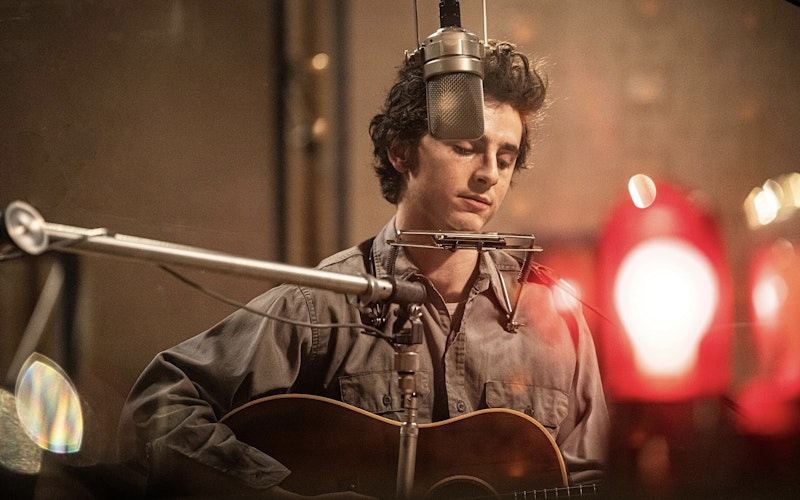
Movies
The Parable of A Complete Unknown
I approached A Complete Unknown, which has been nominated for Best Picture at this year’s Oscars, with a mixture of trepidation and anticipation. Although allergic to Hollywood’s formulaic biopic genre, I am also a massive Bob Dylan fan. Fortunately, A Complete Unknown’s narrow depiction of five tumultuous years in the life of the multi-generational songwriter transcends many of the limitations of its genre. It does so in part by functioning as a kind of scraggly biblical parable.
Like characters in the parables of the unjust steward and prodigal son, Timothée Chalamet’s charismatic if enigmatic Dylan frustrates and defies the expectations of his beloved community. While painful for some, his defiance ultimately frees the young songwriter to reveal complicated truths regarding the calling and purpose of artists in God’s world.
For a true believer like Pete Seeger (Edward Norton, who has been nominated, along with Chalamet, for an Oscar), the calling of an artist is both straight and clear: promote civil rights, resist fascism, and advocate for peace. Drawn together by a mutual affection for Woody Guthrie (Scoot McNairy), Seeger strives to convince his green protégé to remain loyal to the aspirations of the folk movement. At one point, he cajoles young Dyan with another parable, that of the teaspoon brigade, a popular allegory about collectivist change. Eager to please and with a direct line to the songwriting muse, Dylan goes along for a time, eventually becoming a reluctant figurehead of the protest movement. But Dylan fails to fully understand the rushing stream he has stepped into. He fears he will be swept away.
Chalamet’s extraordinary depiction of Dylan, including his impressive musical performances of iconic songs from the era, accentuates the songwriter’s inner turmoil. Bewildered and overwhelmed, this young artist does not yet fully know himself, much less an entire generation. The protester/savior jacket simply does not fit. And he has too much integrity to abide fakery, even for a good cause. When Dylan plugs in his electric guitar at the Newport Folk Festival, he famously chooses a different path. Or, as he resentfully croons to the booing Newport crowd:
Well, I try my best
To be just like I am
But everybody wants you
To be just like them
Enraged by this sacrilegious lack of musical and ideological purity, the Newport folkies revolt. With the fury of the skeptics who drove Jesus out of the synagogue, they refuse to accept their prophet in this new package, zealously shouting “Judas” to electric Dylan. (This reportedly did happen, although not in Newport.) How dare Dylan challenge the orthodoxy of his most ardent followers?
The protester/savior jacket simply does not fit. And he has too much integrity to abide fakery, even for a good cause.
In Surprised by the Parables, Michelle Lee-Barnewall observes that Jesus often used parables “to confront and challenge his audience as well, forcing his listeners to open or close their hearts to the kingdom.” Dylan’s challenging confrontation with his folk base raises thorny questions about the role of artists in God’s world. From Tertullian to Jeremy Collier to the Protestant Reformed Churches in America, Christianity has a long history of fearing art that challenges the strictures of fundamentalism. The irony here is that Jesus used the art of storytelling, in the form of parables, to challenge established beliefs of his time:
“What do you mean that we should be punished by our master for saving our money?”
“What do you mean that the deadbeat little brother should get a full share of the family farm, even after he squandered his inheritance?”
In a similar way, by refusing to give his cherished community what it wanted, Dylan asked his audience to look deeper. Part of Dylan’s rebellious gift was his intuitive understanding that artists are seekers and that truth is complicated. Whether guided by the muse, the Holy Spirit, or simply a desire to authentically explore the difficult questions of humanity, artists must occasionally step beyond the rigidity of a single narrow ideological frame. When they do, pharisees get upset.
If Dylan had followed Seeger’s earnest advice, he no doubt would have written a few more wonderful protest songs. But the world could have missed out on the rich, nuanced, puzzling, and multifaceted beauty of his many later artistic personas. A painfully partial list of what may have been lost includes: the wired-hipster Dylan (Highway 61 Revisited), country Dylan (Nashville Skyline), outlaw Dylan (Pat Garret & Billy the Kid), born-again Dylan (Slow Train Coming), Kabuki trickster Dylan (Desire), disillusioned Old Testament Dylan (Time Out of Mind), Nobel Prize Dylan (Tempest), etc. At their best, each phase “opened hearts” to new truths concealed within God’s multifaceted kingdom.
No less an outsider artist than Paul Schrader may have said it best. A deeply spiritual filmmaker notorious within certain Reformed circles for rebelling against his cloistered community, Schrader posted on social media after viewing an early screening of A Complete Unknown. “I love this movie,” he wrote. “I say that as someone who has known Dylan and this time period. Now I want to see the next one. Then the one after that. There is no six-year period in Bob Dylan's life that isn't fascinating.”
Sixty years after plugging his guitar into that Newport amplifier, octogenarian Dylan is still making pretty good art. A single from his 2020 album, Rough and Rowdy Ways, sums things up well. The title of the track: “I Contain Multitudes.”
_______________
At Think Christian, we encourage careful cultural discernment. We recognize and respect that many Christians choose not to engage with pop culture that contains particular content, such as abuse, sex, violence, alcohol or drug use, or that employs the use of coarse language. To that end, we suggest visiting Common Sense Media for detailed information regarding the content of the particular pieces of pop culture discussed in this article.
Topics: Movies